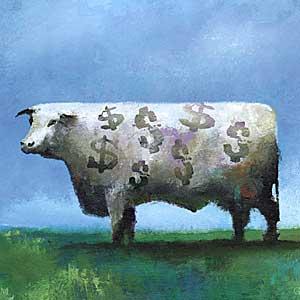Cash Cows: How Much Sense Do Buybacks Make?
 The cow gets so fat it eventually bursts and rains cash.
The cow gets so fat it eventually bursts and rains cash.Stock buybacks -- otherwise known as share repurchases -- are back.
Yep, with a combined $600 billion in the coffers, America's most cash-heavy companies have been rewarding investors by buying back their own stock.
During the quarter that ended June 30, companies in the S&P 500 index spent $81 billion buying back their own shares, a 92 percent increase over the same quarter year ago.
Imagine a company with 100 shares circulating and $100 in annual profit -- or $1 in earnings per share. If the company used a buyback to remove 50 shares from the marketplace, earnings for each of the remaining shares would rise to $2. All else being equal, that should cause the share price to double.
You don't need an MBA from Harvard to know that buybacks are a viable way to increase shareholder value.
Buybacks can be a great way to instill confidence in shareholders when they get the blues about the companies they own shares in.
Scenarios like this are not at all uncommon on Wall Street: Revenues at company XYZ are sluggish. Investors are getting queasy. Management has a psuedo-epiphany and announces the company is buying stock back from shareholders. Everyone toasts, parties, and revels like it's 1999.
Yada, yada.
Is stripping shares out of circulation always a good idea?
Not really.
Most investors get giddy when companies announce buybacks.
I turn cautious.
Investors need to do their homework and ask themselves the proverbial $60,000 question: Is there anything besides a share repurchase that the company could be doing to increase shareholder value?
Accept buybacks at face value, in other words, only when all other opportunities have been exhausted.
Personally, I'd want to know why the company isn't increasing its dividend.
Readers of this site know that the majority of our portfolio is currently tied up in large cap, dividend paying stocks.
Most of them have weathered the market's downturn quite nicely, if we may add.
Dividends are money in your pocket; you can then decide if you want to take the cold cash or buy more shares.
Alternatively, why not spend the cash on research and development, or in some other way that will cause the business to grow?
Or has management has simply run out of ideas for growing the business?
Companies often say their shares are trading at attractive prices, so that buying them is a good investment.
Red flag, anyone? Why is the stock trading lower?
Finally, growth addicts would probably prefer to see the companies they are invested in deploy all their spare cash towards acquisitions.
For growth investors, growth is like crack -- they'll take it any way they can.
<< Home